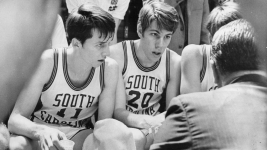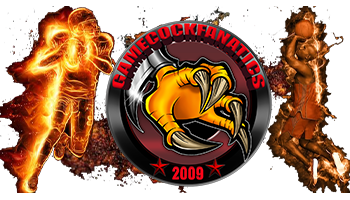An oral history: USC, UVa and a wild 1971 game that proved to be the last of its kind
December 18, 2018
THE STATE

A throwback week in South Carolina basketball begins Wednesday when the Gamecocks host old Atlantic Coast Conference foe Virginia at Colonial Life Arena.
After USC plays Clemson on Saturday, it’ll complete the program’s first two-game stretch against ACC opponents since 1996. Of course, this used to be the norm in these parts.
From 1953-71, South Carolina was a member of the Tobacco Road-based league. And when Frank McGuire was guiding the Gamecocks against the likes of Duke and North Carolina, Columbia very much reflected an ACC town.
“If you had driven around Columbia before McGuire got here and then driven around after he was here,” said Bob Cole, a former sports writer for The State, “you would see such a proliferation of basketball goals over garages, in driveways. They just exploded.
“Of course, McGuire was a Catholic and all of his players were Catholics from New York City. Every time they would go to the line to shoot free throws, they would cross themselves. And you would see all these little kids in the youth programs around Columbia start crossing themselves. Of course, most of them weren’t Catholic at all.”
“We could put 10,000 people in a practice,” said former USC guard Bob Carver. “Every game was sold out and we had great teams.”
But a chunk of that hoops hysteria died after South Carolina left the ACC in the summer of 1971. The Gamecocks became an independent and annual bouts with the Blue Devils, Tar Heels, Terrapins, Wolfpack, Demon Deacons and Cavaliers were no longer.
When UVa, ranked No. 5 in the AP Poll and 3 in the USA Today Coaches Poll, comes to Colonial Life Arena on Wednesday, it’s going to be hard to replicate the scene these programs created on Jan. 11, 1971 in Charlottesville.
A well-over-capacity crowd. A last-second shot that took down a top 10 team. A couple technical fouls, a couple media members — media members! — ejected. A controversial call. A foreshadowing quote from McGuire.
Following is the story, told in the words of those who played and covered it, of Virginia’s wild 50-49 win over South Carolina — and its significant aftermath.
The Gamecocks entered the 1970-71 season as the No. 2 team in the country. Behind All-American guard John Roche and a cast of talented New Yorkers, USC got off to an eventful 10-1 start. On Dec. 5, it beat No. 5 Notre Dame in South Bend, Indiana. On Dec. 20, it beat No. 5 Western Kentucky in Columbia. In between, the Gamecocks had a blowout victory over Maryland marred by a brawl that’s most famous for John Ribock’s apparent punch to the face of Terrapins coach Lefty Drissell.

Parkhill’s bucket was UVa’s eighth in 11 second half field goal attempts. The Cavaliers shot 65 percent for the game. When USC’s Rick Aydlett missed a contested jumper on the other end, the buzzer sounded and the floor filled with fans.
Powell: I can see Rick falling into the crowd.
Millsaps: I got trampled. Everybody who sat at the press table got trampled. Fans were everywhere. I’m just glad nobody got hurt in the aftermath of the thing.
Carver: That wasn’t a lot of fun.
Parkhill: Rick Aydlett’s a great friend. I haven’t seen him in a long time, but he’s a really good friend. He worked at Converse for many years. But we won the game. Looking back, that was a big win. But that stretch, I think it proved that we could win in the league. We could be competitive. That was an important moment in the history of basketball here.
Virginia debuted at No. 19 in the next poll. The Cavaliers made their first NIT the next season. They were ACC champs in ‘76 and Final Four bound in ‘81 and ‘84. UVa has now made the NCAA Tournament 22 times.
After the Virginia loss, South Carolina reeled off 13 wins in 14 games, including the ACC Tournament championship over North Carolina. It was USC’s final appearance in the league. Athletics director/football coach Paul Dietzel officially led the Gamecocks out of the ACC in the summer of ‘71. They’ve made the NCAA Tournament eight times since. They went 43 years between Big Dance wins before the surprise Final Four run in 2017.
Carver: There was a lot of things Coach McGuire didn’t like about the academic requirements in the ACC, but there was more of a football motivation for leaving the league. Dietzel, he wanted to build a powerhouse and he felt like he could do it better as an independent — whether Coach McGuire knew about it or not.
We were all playing in the gym one day and Donnie Walsh came in and said, ‘You guys, we just left the league. Coach McGuire’s on the phone trying to fill out your schedule.’
Powell: I didn’t think it was a good idea, personally, as 20-plus year-old senior. I personally thought we should have stayed because we just won the ACC. We were really doing well recruiting. I just thought we were better off there. You become an independent at that time was not probably the way to go.
Joyce: We didn’t want out. It was not going to be good for the basketball program.
Cole: I’ve thought about it many times and it’s really hard to assess what would have happened had they stayed.
Carver: It would have been a better story. It would have been a better run. We had established ourselves with those teams as someone to contend with.
*quotes taken from the Jan. 12, 1971, edition of The State newspaper.

December 18, 2018
THE STATE

A throwback week in South Carolina basketball begins Wednesday when the Gamecocks host old Atlantic Coast Conference foe Virginia at Colonial Life Arena.
After USC plays Clemson on Saturday, it’ll complete the program’s first two-game stretch against ACC opponents since 1996. Of course, this used to be the norm in these parts.
From 1953-71, South Carolina was a member of the Tobacco Road-based league. And when Frank McGuire was guiding the Gamecocks against the likes of Duke and North Carolina, Columbia very much reflected an ACC town.
“If you had driven around Columbia before McGuire got here and then driven around after he was here,” said Bob Cole, a former sports writer for The State, “you would see such a proliferation of basketball goals over garages, in driveways. They just exploded.
“Of course, McGuire was a Catholic and all of his players were Catholics from New York City. Every time they would go to the line to shoot free throws, they would cross themselves. And you would see all these little kids in the youth programs around Columbia start crossing themselves. Of course, most of them weren’t Catholic at all.”
“We could put 10,000 people in a practice,” said former USC guard Bob Carver. “Every game was sold out and we had great teams.”
But a chunk of that hoops hysteria died after South Carolina left the ACC in the summer of 1971. The Gamecocks became an independent and annual bouts with the Blue Devils, Tar Heels, Terrapins, Wolfpack, Demon Deacons and Cavaliers were no longer.
When UVa, ranked No. 5 in the AP Poll and 3 in the USA Today Coaches Poll, comes to Colonial Life Arena on Wednesday, it’s going to be hard to replicate the scene these programs created on Jan. 11, 1971 in Charlottesville.
A well-over-capacity crowd. A last-second shot that took down a top 10 team. A couple technical fouls, a couple media members — media members! — ejected. A controversial call. A foreshadowing quote from McGuire.
Following is the story, told in the words of those who played and covered it, of Virginia’s wild 50-49 win over South Carolina — and its significant aftermath.
The Gamecocks entered the 1970-71 season as the No. 2 team in the country. Behind All-American guard John Roche and a cast of talented New Yorkers, USC got off to an eventful 10-1 start. On Dec. 5, it beat No. 5 Notre Dame in South Bend, Indiana. On Dec. 20, it beat No. 5 Western Kentucky in Columbia. In between, the Gamecocks had a blowout victory over Maryland marred by a brawl that’s most famous for John Ribock’s apparent punch to the face of Terrapins coach Lefty Drissell.

Parkhill’s bucket was UVa’s eighth in 11 second half field goal attempts. The Cavaliers shot 65 percent for the game. When USC’s Rick Aydlett missed a contested jumper on the other end, the buzzer sounded and the floor filled with fans.
Powell: I can see Rick falling into the crowd.
Millsaps: I got trampled. Everybody who sat at the press table got trampled. Fans were everywhere. I’m just glad nobody got hurt in the aftermath of the thing.
Carver: That wasn’t a lot of fun.
Parkhill: Rick Aydlett’s a great friend. I haven’t seen him in a long time, but he’s a really good friend. He worked at Converse for many years. But we won the game. Looking back, that was a big win. But that stretch, I think it proved that we could win in the league. We could be competitive. That was an important moment in the history of basketball here.
Virginia debuted at No. 19 in the next poll. The Cavaliers made their first NIT the next season. They were ACC champs in ‘76 and Final Four bound in ‘81 and ‘84. UVa has now made the NCAA Tournament 22 times.
After the Virginia loss, South Carolina reeled off 13 wins in 14 games, including the ACC Tournament championship over North Carolina. It was USC’s final appearance in the league. Athletics director/football coach Paul Dietzel officially led the Gamecocks out of the ACC in the summer of ‘71. They’ve made the NCAA Tournament eight times since. They went 43 years between Big Dance wins before the surprise Final Four run in 2017.
Carver: There was a lot of things Coach McGuire didn’t like about the academic requirements in the ACC, but there was more of a football motivation for leaving the league. Dietzel, he wanted to build a powerhouse and he felt like he could do it better as an independent — whether Coach McGuire knew about it or not.
We were all playing in the gym one day and Donnie Walsh came in and said, ‘You guys, we just left the league. Coach McGuire’s on the phone trying to fill out your schedule.’
Powell: I didn’t think it was a good idea, personally, as 20-plus year-old senior. I personally thought we should have stayed because we just won the ACC. We were really doing well recruiting. I just thought we were better off there. You become an independent at that time was not probably the way to go.
Joyce: We didn’t want out. It was not going to be good for the basketball program.
Cole: I’ve thought about it many times and it’s really hard to assess what would have happened had they stayed.
Carver: It would have been a better story. It would have been a better run. We had established ourselves with those teams as someone to contend with.
*quotes taken from the Jan. 12, 1971, edition of The State newspaper.

